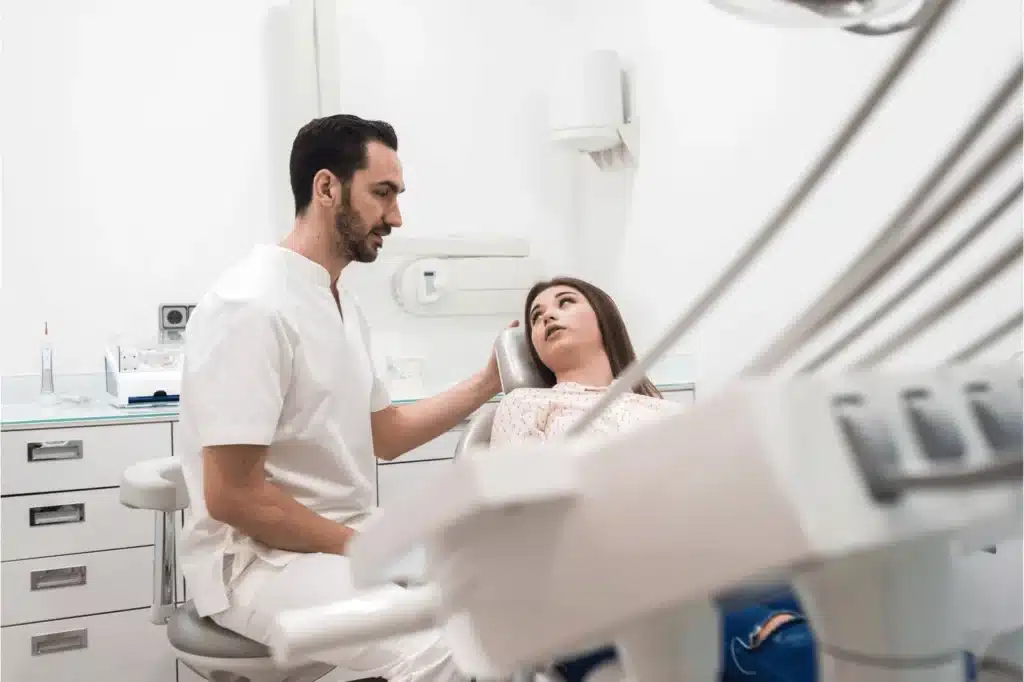The connection between pacemakers and dental visits is meaningful. It shows how caring for your teeth can help your heart. Let’s learn more about it.
What is a Pacemaker?
A pacemaker is a tiny device that runs on a battery. Doctors put it in your chest or belly to help your heart stay in a regular rhythm. It sends little electric signals to your heart to keep it beating correctly.
Function
Think of a pacemaker as a backup for your heart. It watches how your heart beats. If it notices anything wrong, it sends signals to fix it. This way, your heart can keep working safely.
Types of Pacemakers
There are different types of pacemakers, like ones with one wire, two wires, or even three wires. Each type helps with different heart problems.
Dental Health and Pacemakers
Taking care of your teeth is really important because it’s not just about your mouth. Bad teeth can lead to other health problems, including heart issues. This is especially crucial for people with pacemakers and dental visits.
Precautions
People with pacemakers might have some particular worries when they visit the dentist. These concerns include a higher chance of getting an infection because of the pacemaker wires. Don’t worry about pacemakers and dental visits. There are certain precautions to follow:
If you have a pacemaker and need to go to the dentist, it’s essential to talk to your dentist and heart doctor. They need to know about your pacemakers and dental visits to ensure everything is safe. Talking to them helps you feel better and ensures your dental visit goes smoothly. Communication is the key to a stress-free trip to the dentist for pacemaker patients.

Getting Ready for a Dental Visit
Before going to the dentist, people with pacemakers should talk to their heart doctor (cardiologist). The heart doctor helps by in pacemakers and dental visits:
Cardiologist’s Role: They look at your heart to make sure it’s safe for you to have dental treatment. This way, the dentist knows if there are any particular things to watch out for.
Reviewing Medicines: The heart doctor checks your medicines to see if they can affect your pacemaker or dental treatment. They need to make some changes to keep everything safe.
Telling the Dentist: It’s important to let your dentist know about your pacemaker. This helps the dentist choose the right tools and methods for your dental work.
During the Dental Visit
Follow these points in case of pacemakers and dental visits:
Safe Equipment: The dental team knows how to use equipment that won’t cause problems for your pacemaker. So, your device will work just fine during your dental treatment.
Watching Your Health: The dentist monitors your vital signs, like your heart rate, to ensure everything is going well. If something looks off, they can take care of it right away.
Emergency Plans: Though rare, the dental team is ready for emergencies. They can quickly help if something unexpected happens during your visit.
After the Dental Visit
After you leave the dentist, it’s essential to:
Check for Any Issues: Pay attention to how you feel around your pacemaker site. Tell your dentist or heart doctor immediately if something doesn’t feel right.
Follow Instructions: If your dentist or heart doctor gives you any special instructions after your dental visit, make sure to follow them.
Stay in Touch: If you have any worries or strange feelings about your pacemaker after the dental visit, don’t hesitate to call your heart doctor or dentist. They’re there to help.
Common Dental Procedures
People with pacemakers may need different types of dental care, including:
Regular Cleanings and Check-ups
Just like everyone else, it’s essential to have regular dental check-ups to keep your teeth healthy.

Dental Fillings and Restorations
When cavities or dental damage occur, fillings and restorations are necessary. Dentists ensure that materials and procedures are safe for patients with pacemakers.
Extractions and Oral Surgeries
In cases of severe dental problems, extractions or oral surgeries may be required. Dentists and oral surgeons take precautions to ensure a smooth procedure, minimizing risks to the pacemaker.
Orthodontic Treatments and Braces
Orthodontic care, including braces, can enhance dental health and aesthetics. Patients with pacemakers can still benefit from these treatments with appropriate safety measures in place.
Conclusion
Maintaining dental health is vital for everyone, including individuals with pacemakers. Concerns about pacemakers and dental visits can be solved through effective communication between the patient, the dentist, and the cardiologist. Always inform your dentist before any dental procedures so that they ensure your safety.


